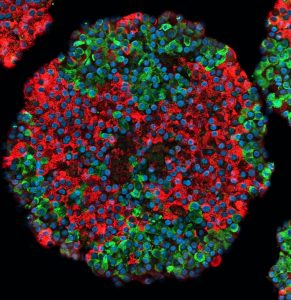Diabetes: functional pancreatic beta cells created from stem cells for the first time
Biología, Innovación, Research and Innovation
células beta pancreáticas, celulas madre, diabetes, tratamiento
7 March 2022
Postdoctoral researcher Diego Balboa from the Center for Genomic Regulation (CRG), in collaboration with a research team from the University of Helsinki, has carried out a study showing that these pancreatic beta cells created from stem cells are capable of controlling glucose metabolism efficiently. This is due to its high ability to mimic the structure and functionality of normal pancreatic islet cells.
The research published in Nature Biotechnology constitutes a great advance in the treatment of diabetes since these beta cells of the pancreas are responsible for the production of insulin, a vital hormone that regulates blood sugar.
“Our study is an important step forward in transforming stem cells into spare parts to replace destroyed or damaged beta cells in the pancreas that cause diabetes”. Diego Balboa, CRG researcher.
Until now, patients with type 1 diabetes, caused by the destruction of pancreatic beta cells, could regain the ability to produce insulin by transplanting these cells isolated from the pancreas of organ donors. A very complex, expensive and unusual treatment. That is why scientific efforts have focused on producing functional pancreatic beta cells from stem cells. This study is the first to do so successfully and is the most comprehensive to date, demonstrating its conclusions in both cell culture and rodent studies.

